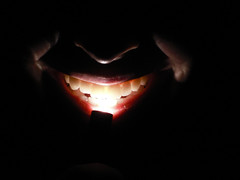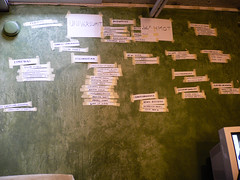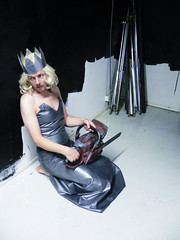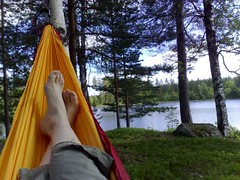
Cheshir Cat can has cheezburgr? (sorry)
Time to get back into Alice ad infinitum.
We've been trying on each other's characters and the results are terribly fun. It's somehow very satisfying to dress up as your colleague would do and try to use their character rules to build your own thing. The only problem is that if you have the same pants, you can't both be wearing them at the same time.
At the moment the main tasks are rather space and time related. As in, building new areas in the Höyhentämö (our space on Korkeavuorenkatu in Helsinki), putting up curtains, thinking about mirrors and lights, and then organizing things in order, some kind of dramaturgy, for lack of a better word. If it's not a drama, what kind of urgy are we supposed to have? We have a whole slew (and I mean a really really large number) of characters, and thankfully a smaller number of places where they exist, including places like New York, Wonderland, outer space, and in the mirror. We're still building new characters but none of them really has anything like a story attached to them, or a through-line. Everyone's leaving all the time, never to return. They kind of have encounters or situations, and then that's it. Poof, they're gone.

Attempting to organize
Which is not to say, I think, that the point is to not give an audience some threads to follow. I can't really say what these threads are like, but they probably will have something to do with space. Not just outer space, but where the scenes are set, where things happen in our imagination, and where things happen physically on the stage and in the whole performance area. Having
something consistent is rather necessary for any kind of (even post-narrative-type) threads to get their weave on. So we'll probably have, say, a few scenes in space, a few scenes in the Looking Glass land, and so on. And if characters come back, that also helps.
In
Beyond the Red Room, a piece from 2004 at Naamio ja Höyhen and also directed by Eki Vuori, there was a small space with rather tight and simple rules. Colours (created by light) indicated what kind of a world the audience was in. It wasn't the only indication, but it was a consistent throughline, and it took me many viewings of the piece (I ran lights, or colours if you like) to actually clue in to the logic. The more inconsistencies you have in a piece, the more an audience appreciates a strong, simple throughline. Films like
Mullholland Drive operate with these principles. MH is disorienting enough to keep you from hoping after a watertight story, but it's not so disjointed that you can't follow or get involved in what's going on. I rather think that complete anarchy on the stage is annoying and doesn't give an audience all that much aside from the potential for a few brilliant moments. We're people. We need something to hang on to while we're shown something beautiful.
On the other hand, I'm also kind of aware of the fact that me even discussing the process in pieces like Elektra and Alice sounds a bit stupid from time to time. I don't want to explain things away, obviously, but when I say "Filthy Rabbit" I have a very clear idea of what that is and how it got into the performance, but you peeps don't. Or if I talk about Looking Glass Land or "Me-ness" in the context of this show... I feel a bit idiotic, as I know I'm not really communicating, but I just feel I have to carry on like that. I've noticed in devising theatre that
some kind of common language is always developed. A group will never be able to work exactly the same way as they did last time, because the people have changed and the aims of the work have changed. So we make stuff up as we go along and because we also need to talk about it, we name it when we make it up. Which is fine for those of us working on the thing itself, but woe to anybody who has to listen to me talk about it. :)
Characters have speeches, but they're not terribly fixed. Many of them have even only been improvised once, scribbled down, maybe gone over a couple more times if they're lucky, with a bit of feedback, and that's pretty much where they are. The all-out
freshness even reminds me of working with clown: you have your character's basic outline of behaviour, and then you simply pay attention to (and meticulously, lovingly, gratefully capitalize on) all the accidents that start to happen as soon as you present the character.

Juha puts on the silver queen
And the clothes, the makeup: they're irresistable. When trying out Akseli's filthy rabbit the other day, I started out all business: calmly and rationally get the costume, find the makeup, backcomb the hair, consider what this character will be like, and I noticed that as I was putting the finishing touches on the makeup, I was already in character. I was moving differently, doing my businesslike business with a messy and playful flair that was really for nobody but myself. Or was it for the character? What happened? Why is it that the simple act of putting on clothes can change how we are so easily and completely? I know I haven't explained it to make it nearly as interesting as I find it, but the thing is that some costumes don't really work. You can feel that they don't fit, there's no place for this thing, and you're just turning on a character from your own hard work. But then you get a costume that just starts to turn
you on instead, unlocking itself gradually as you add more elements, and it's not
work to do this character. It is simply the way you move, talk, and act to match the clothes.
I know I mentioned this before in an earlier post. I wanted to come back to it because it showed up again so strongly when we tried on each others' characters. And it's a fascinating question, when you think that actors can spend their entire lives training physically and vocally, practicing and thinking endlessly about a role, even rehearsing for weeks or months in rehearsal clothes, not a costume at all, and then an experiment like this comes along and makes you wonder about your previous rehearsal process. Mind, I can also sense that I'm much more sensitive to whether characters switch themselves on or whether I'm working to bring them out, because I happen to be paying attention to the process.
I'm aware that after 10 years of training, this may sound hopelessly naive. Just imagine as you wake up one day and you start to notice the mechanics of the process by which you move from sleeping to awake, and from then on you keep finding yourself waking up from time to time and noticing something new about that process, until eventually you can't wake up without observing yourself.



